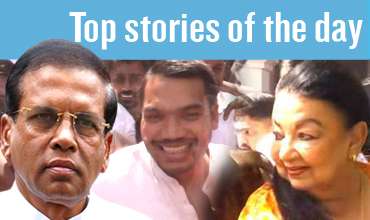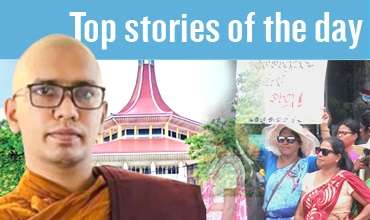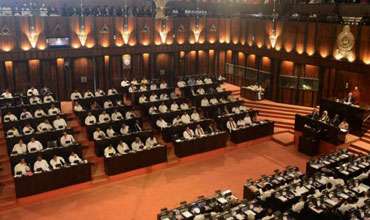Experience sharing for a new vision
By G.R.M. Gamlath
The theme of "Experience sharing for a New Vision" has become a highly significant and widely discussed topic in contemporary global national development discourse. As institutions, countries, and individuals face emerging challenges, the exploration of experience sharing becomes increasingly crucial. Given that society is undergoing a highly critical phase in terms of generating new ideas and policies, the need for credible and accurate information sharing has intensified. Such sharing not only enhances the knowledge base of individuals and organisations but also contributes to the development of stronger and forward-looking economic and social systems.
By facilitating the sharing of experiences, individuals can share the knowledge they have gained through personal experiences and practical problem-solving, fostering innovative approaches and productive policies. Across various sectors, experience exchange promotes the dissemination of initial ideas, modern technology, and practical trends, while also refining concepts and interests aligned with specific objectives.
Through direct interactions, individuals can connect with experts, access fresh perspectives, and leverage transformations to navigate challenges and achieve success. Experience sharing plays a vital role in numerous areas, such as starting new businesses, conducting international trade, and implementing cooperative initiatives. One of its primary advantages lies in its ability to create direct exchanges of specialised information, components, and preferences, ultimately supporting economic growth and the generation of new ideas.
For instance, when institutions engage in experience exchange within the realm of industrial planning, they gain insights into emerging technological advancements and standards, enabling them to improve economic performance. Similarly, in education, experience sharing fosters new perspectives by allowing academics and experts to share knowledge, trends, and concepts across universities, educational institutions, and professional practices.
Challenges
However, experience sharing is not without challenges. Ensuring trust and transparency in knowledge sharing is essential, as some business or social organisations may hesitate to disclose information swiftly. In such cases, maintaining reliable and ethical information-sharing environments becomes crucial. Moreover, the effectiveness of experience sharing depends on all parties engaging in a structured manner, with clear strategic goals and mutual trust. The concept of "Experience Sharing for a New Vision" empowers individuals, institutions, and nations to better prepare for significant social and economic transformations. By addressing challenges and seizing future opportunities, such exchanges pave the way for enhanced societal and economic success at the highest levels.
The next important subject to cover, in accordance with the discourse mentioned above, is "Establishing a Triangular Framework for Experience Sharing Towards a New Vision." Through the facilitation of knowledge exchange in business, social, and organisational activities, this concept is crucial for developing new opportunities and frameworks. People and organisations can improve their problem-solving skills, develop business and social strategic frameworks, and create economic value by establishing a triangular framework for experience sharing.
Experience sharing is the process by which people or organisations share their practical knowledge and experiences, which has major advantages. Making sure that knowledge is transferred effectively and that the right frameworks are used is crucial to creating a new vision. By determining contextual backgrounds, necessary reforms, and the economic and social factors influencing the development of new ideas, conducting experience sharing using triangular analytical methodologies improves success.
When choosing a triangular framework, it is possible to better analyse suggested approaches and policies for presenting a new vision by incorporating various experiences and reform methodologies into a well-structured framework. In order to improve learning outcomes and build stronger relationships, some experience sharing also offers chances to interact with social perceptions and new economic frameworks.
Furthermore, experience sharing enables organisations to recognise and collaborate with creative and productive trends that go beyond their own purview in the face of swift technological and economic change.
Experience sharing offers chances to develop new trends and policies in addition to a forum for examining previous best practices. When a triangular inquiry is integrated into a business or social experience sharing, the open and transparent sharing of experience improves the flow of ideas and information.
Setting up a triangular inquiry in an experience sharing promotes the development of priorities and makes it possible for pertinent groups and individuals to efficiently share precise and strategically aligned knowledge. This triangular investigation also makes it easier to structure suitable frameworks that are in line with reforms, practical economic trends, and technological developments. A new vision, successful innovation, and the development of collaborative sectors for significant results all depend on the process of establishing a well-organised and trustworthy triangular inquiry within experience sharing.
We now need to take appropriate action after carefully analysing the long-term and sustainable aspects of both national and individual development. The idea of "Experience Sharing for a New Vision in National Development Thinking and Sustainability: Establishing a Triangular Framework" should be regarded with great importance and wisdom in this respect.
Establishing a trustworthy and devoted human connection is crucial to advancing national development because it makes it easier to formulate a modern vision that addresses current needs and ensures a sustainable future. In order to successfully apply national development thinking, a triangular methodology must be used to develop creative strategies and policies that are discovered through experience sharing between local and international viewpoints.
One of the most important steps in advancing national progress is identifying the main goals of national development and creating a new vision that supports them. The sharing of various development strategies can aid in identifying efficient approaches and methodologies for advancement through experience sharing and a triangular foundation.
It is feasible to create a triangular methodology to find new tactics crucial for national development by fusing global experiences with regional institutions and policies. This strategy improves the sustainability and efficacy of national development programs. A significant and creative national development vision can be produced by emphasising sustainable development, drawing on successful global experiences, and integrating regional tactics and best practices.
At the national level, sharing new ideas, recognizing progressive concepts and processes, and formulating new strategies through triangular implementation mechanisms will contribute to growth. Through experience sharing, the sharing of knowledge and best practices will enable the development of alternative and realistic strategies, making national development initiatives more practical and sustainable. In national development, concepts and performance-oriented activities that hold priority can be enhanced by applying a triangular inquiry approach. This allows for the integration of past experiences and best practices while fostering the initiation of new strategies.
National development
Additionally, the need for a "Human Behavioural Model for National Development Thinking and Sustainability" needs to be carefully considered with a clear goal in mind. Since it has a substantial impact on both practical results and economic and social benefits, it is imperative that the necessity of a human behavioural model be emphasised throughout the process of national development.
Every activity in the modern world is intrinsically linked to human capital, and this relationship is tightly intertwined with financial resources. It is also linked to every other physical resource, creating an all-encompassing innovation process. In the end, this advances the national development of a country.
Increasingly, the goal of sustainable development is to create a successful society with long-term stability, and achieving this requires fair participation from every sector of society. In this instance, the use of such a human behavioural model is necessary for building effective relationships and productive processes within development planning, ensuring a practical and sustainable approach to progress.
Moreover, a human behavioural model can be effectively implemented by incorporating development strategies that address the diverse needs, aspirations, and cultural variations of different individuals in society. In national development, this model should not be confined only to economic activities such as education, healthcare, and environmental conservation but should also extend to social development initiatives.
Further, such a model prioritises individual and community development, ensuring that all sectors grow harmoniously. Some development efforts require accurate and up-to-date information, proper dissemination of knowledge, and practical implementation to achieve their intended objectives. By putting such a human behavioural model into practice, people and organisations can function with responsibility, accountability, and appropriate adherence to rules. This strategy highlights high ethical standards, encourages creative ideas, and creates new paradigms when incorporated into a sustainable development pathway. As a result, the national development foundation is strengthened and is better equipped to develop and grow.
Therefore, the concepts of "Experience Sharing for a New Vision," "A New Vision for National Development Thinking and Sustainability," and "The Need for a Human Behavioural Model" are inherently interconnected. Establishing a strong and effective national development framework requires identifying the correct perspectives, policies, and strategies and implementing them efficiently.
The strategy derived from "Experience Sharing" integrates practical and scientific foundations by combining regional and international experiences, allowing for the formulation of a new and comprehensive vision. When implementing national development initiatives, the sharing of experiences enhances the effectiveness of regional and international foundations and policies. This approach enables a thorough understanding of development strategies aligned with broader national objectives.
"A New Vision for National Development Thinking and Sustainability" provides an opportunity to systematically plan development efforts by incorporating new knowledge and strategies, ensuring long-term and sustainable progress. Successful execution of development processes requires experience sharing and an integrated strategic approach to identify national system requirements and optimise existing opportunities.
Moreover, when considering "The Need for a Human Behavioural Model," it becomes evident that introducing progressive perspectives and a new vision for human transformation in national development efforts is more effective. Ensuring fair participation for all individuals and achieving balanced development across all sectors of society necessitates a well-structured human behavioral model. Such a model contributes to the sustainability of development processes. Ultimately, the integration of a human behavioural model, experience sharing, and a comprehensive strategic approach collectively paves the way for a renewed vision of national development thinking and sustainability. This alignment serves as a fundamental guiding framework for fostering long-term and sustainable national progress.
As discussed above, the complex and transformative concepts of "Experience Sharing for a New Vision," "National Development Thinking and Sustainability Leading to a New Vision," and "The Need for a Human Behavioural Model" generate an interconnected framework. At the core of a more active and efficient national development strategy is the identification of appropriate concepts, strategies, and policies, along with their effective implementation.
"Experience Sharing" enables the integration of regional and international knowledge by combining both scientific and practical foundations, which helps in the formation of a new and comprehensive vision. The experience sharing enhances the effectiveness of regional and international frameworks, ensuring a thorough understanding of development strategies that are aligned with broader national objectives.
A "New Vision for National Development Thinking and Sustainability" provides an opportunity to establish long-term, sustainable development goals, achieved through new knowledge and effective strategies. Successful execution of development strategies requires experience sharing and a collective approach to identifying national system requirements while making the best use of available opportunities.
Moreover, the "Need for a Human Behavioral Model" emphasizes that introducing progressive concepts and new visions for human transformation within national development efforts is highly effective. Providing equitable participation for all individuals is crucial for achieving balanced development across all sectors of society, and a well-structured human behavioural model can contribute to ensuring the sustainability of development processes. The integration of a human behavioural model, experience sharing, and collective strategic approaches provides the necessary framework to create a new vision of national development thinking and sustainability. This combined approach contributes significantly to achieving long-term national progress.
(The writer is a Senior Lecturer in Accounting and Finance at the Department of Finance and Accountancy, Faculty of Business Studies, University of Vavuniya. He can be contacted at methikalak@gmail.com)
-
Still No Comments Posted.
















Leave Comments